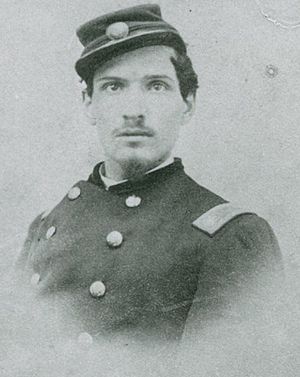William Wade Dudley facts for kids
Quick facts for kids
William W. Dudley
|
|
|---|---|
 |
|
| 13th United States Commissioner of Pensions | |
| In office June 27, 1881 – November 15, 1884 |
|
| President | James A. Garfield Chester A. Arthur |
| Preceded by | John A. Bentley |
| Succeeded by | Otis P. G. Clarke |
| United States Marshal for the District of Indiana | |
| In office 1879–1881 |
|
| President | Rutherford B. Hayes |
| Personal details | |
| Born |
William Wade Dudley
August 27, 1842 Weathersfield Bow, Vermont |
| Died | December 15, 1909 (aged 67) Washington, D.C. |
| Resting place | Arlington National Cemetery Arlington, Virginia |
| Political party | Republican |
| Spouses |
|
| Children |
|
| Signature | |
| Military service | |
| Allegiance | |
| Branch/service | Union Army |
| Years of service | 1862–1865 |
| Rank | |
| Unit | 19th Ind. Vol. Infantry Reg. |
| Battles/wars | American Civil War
|
William Wade Dudley (August 27, 1842 – December 15, 1909) was an American lawyer, politician, and Union Army officer in the American Civil War. He was United States Commissioner of Pensions under presidents James A. Garfield and Chester A. Arthur, and was Treasurer of the Republican National Committee. He was wounded and lost his leg at Gettysburg.
Early life
William Wade Dudley was born in Weathersfield Bow, Vermont, the son of Reverend John Dudley, a well-known Congregational minister whose sermons were widely reprinted. Reverend Wade was a graduate of Yale Seminary, a sometime missionary to the Choctaw Indians, and a descendant of William Dudley, one of the earliest settlers of Guilford, Connecticut, in 1639. Dudley's mother was Abigail Wade, a granddaughter of Col. Nathaniel Wade, a staff officer to General George Washington during the Revolutionary War.
Civil War and postbellum years
After studying at Phillips Academy, Danville, in Vermont, and at Russell Military Academy in New Haven, Connecticut, he joined the Union Army as captain of the Richmond City Greys—volunteers for service in the American Civil War. Dudley's company was incorporated into the 19th Indiana Volunteer Regiment of the famed Iron Brigade of the Army of the Potomac. At age 19, at the Battle of Antietam, he took command of the regiment after the death of Lieutenant Colonel Alois O. Bachman. Following the battle, Dudley was quickly promoted to Major (September 18, 1862), and then Lieutenant Colonel (October 6, 1862).
After losing 79 percent of his men at the Battle of Gettysburg, and having his right leg amputated on the field, he served as an army inspector and judge advocate and captain in the Veteran Reserve Corps. For gallantry in battle, he was awarded an honorary brevet to Brigadier General of Volunteers on March 13, 1865.
Following the end of the war he became a civilian lawyer in 1870, then the U.S. marshal for Indiana in 1879, commissioner of pensions under appointment of Presidents James Garfield and Chester A. Arthur in 1881. In 1888 he was appointed Treasurer of the Republican National Committee. He returned to practicing law in 1887.
Personal life and death
Wade married his first wife, Theresa Fiske, in 1864, and they had four children together. After his wife's death in 1897, he married Nannie A. Robinson and they stayed married until Dudley's death. She died in 1949.
On December 15, 1909, William Wade Dudley died of natural causes in Washington, D.C., and was buried in Arlington National Cemetery a few days afterward.

